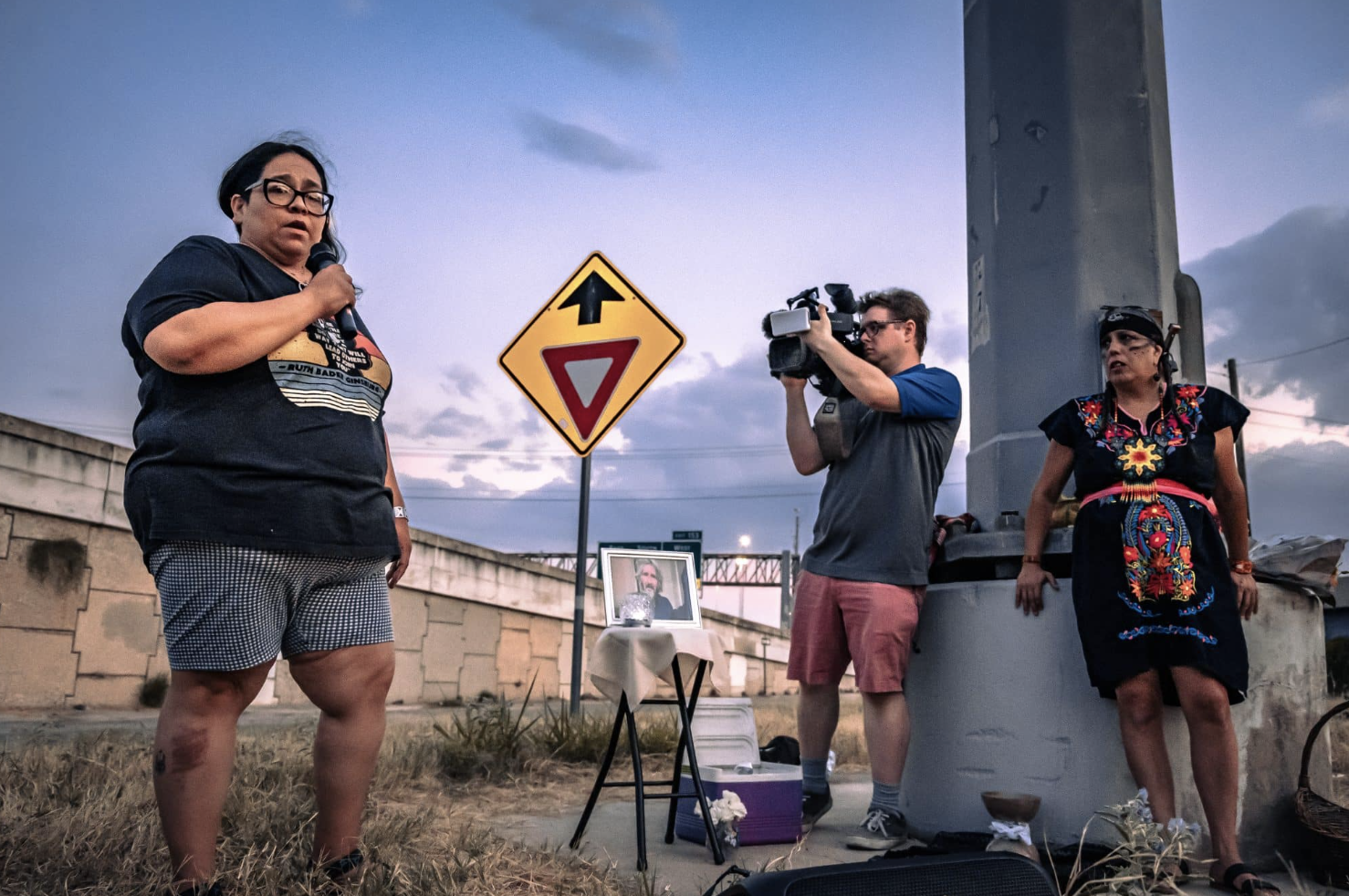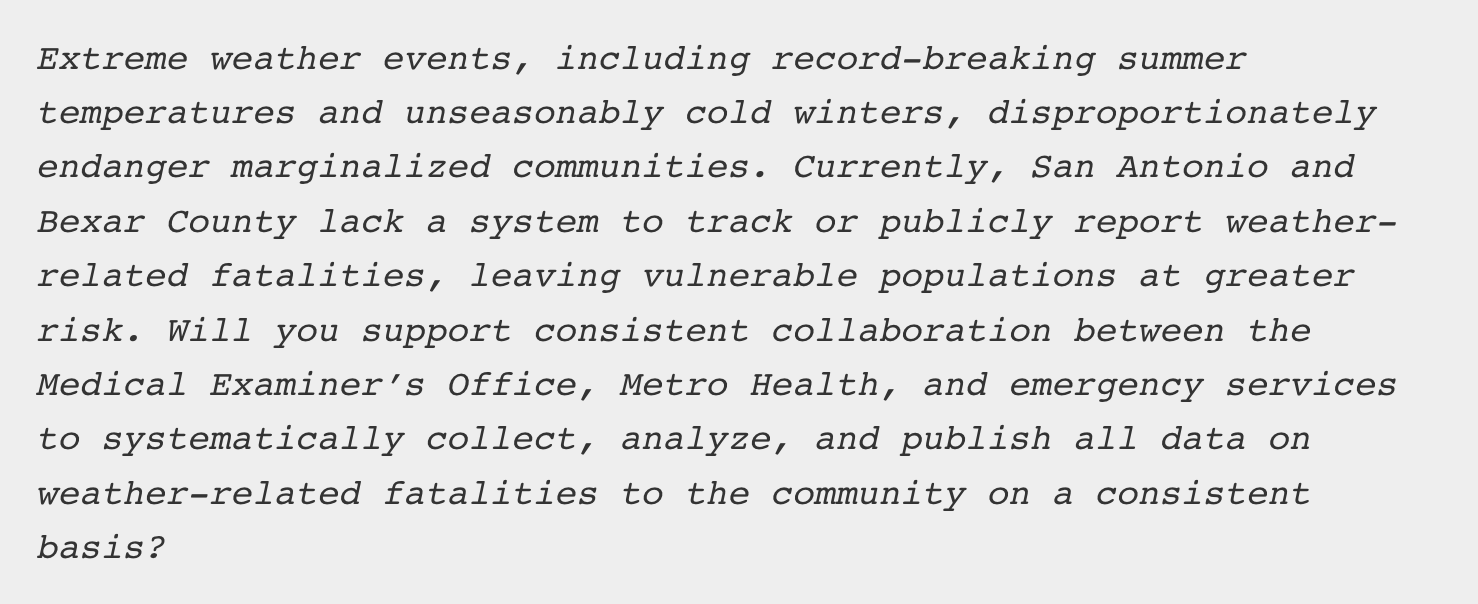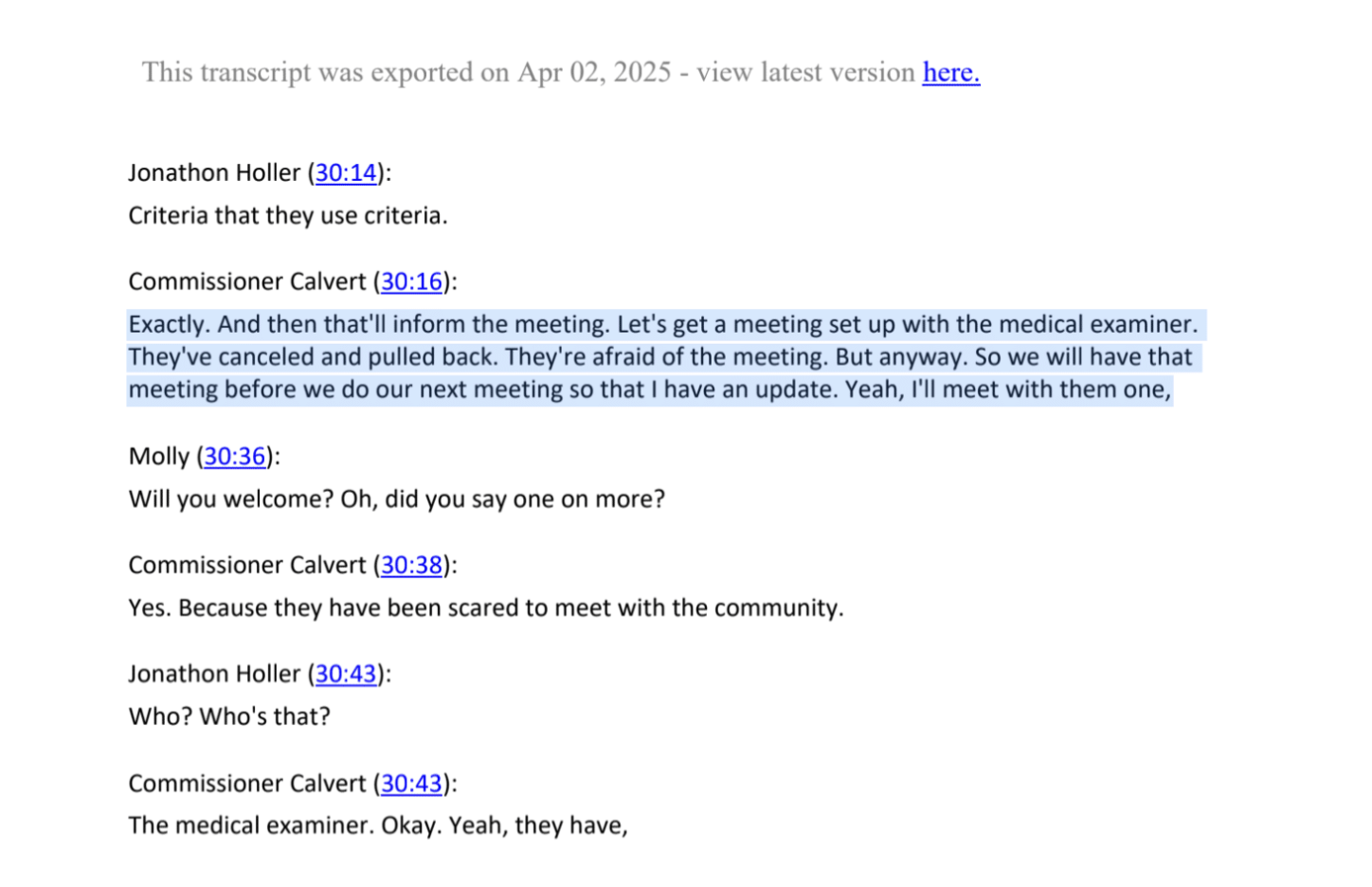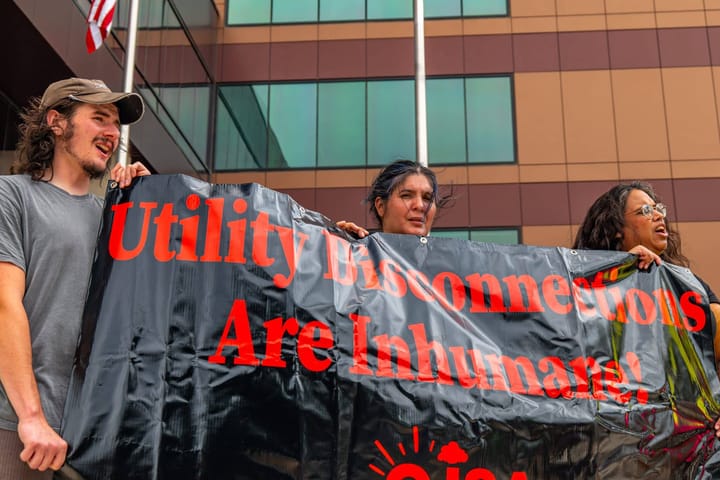San Antonio Council Members Call For Tracking Extreme Heat’s Impact
Advocates say the effort would begin repairing a system that fails to account for heat-related deaths across the community. But Bexar County’s partnership remains uncertain.

This article was originally published by Deceleration
After Jessica Witzel collapsed and died in the driveway of a Five Points gas station in San Antonio, her body temperature was recorded at a monstrous 126F degrees. A former coroner consulted by Deceleration said they could not “imagine a situation more obvious” for heat-related death classification, occurring on the hottest day of 2024. Yet the Bexar County Medical Examiner’s autopsy, released to Deceleration by a state open records request, failed to link the death to heat. Instead, the presence of a low level of methamphetamine, possibly due to a prescribed ADHD medication, was used to declare it a drug overdose instead.
The case did not shock those familiar with Bexar County’s long-standing refusal to track heat-related deaths. And Bexar County is not unique in Texas, where heat deaths are likely widely undercounted, the Texas Tribune has reported. Poor data collection is understood to be a national problem hampering public health efforts across the board. The U.S. Occupational Safety and Health Administration, for example, admitting that existing data on worksite heat deaths were “vast underestimates.”
Marisol Cortez’s story about Witzel’s autopsy asks: “How many other heat-related deaths among unhoused residents are being erased by the failure to collect and report accurate data on climate-related mortality?”
Now two San Antonio City Council members are asking the same question, hoping to make San Antonio and Bexar County exemplars in accurate heat surveillance in a state that frequently looks the other way. On Monday, April 21, 2025—one day before Earth Day—Teri Castillo (D5) and Jalen McKee-Rodriguez (D2) filed a Council Consideration Request with the subject line: “Tracking and Preventing Heat Deaths.”
If approved, it would direct the San Antonio Metropolitan Health District to “explore best practices of tracking heat-related deaths in the City of San Antonio through an intergovernmental collaborative effort with the Bexar County Medical Examiner’s Office, City and County public safety departments, and local hospitals.”
“Councilman McKee-Rodriguez is interested in this policy because he understands that the climate crisis is causing sickness and death outcomes for many of our most vulnerable constituents,” said Denise Hernandez Borrego, director of policy for McKee-Rodriguez.
“It is difficult to create quality policy without quality data, and our community is missing very necessary information. It is our hope the reporting will assist in creating and funding climate resilient programs, infrastructure, and education to decrease illness and death caused by our increasing temperatures.”
Hernandez credited the work of Deceleration and the local advocacy organization Southwest Workers Union for helping bring the need to Council’s attention.
Additionally signing on to the CCR in support are Sukh Kaur (D1), Phyllis Viagran (D3), and Melissa Cabello Havrda (D6).
The year Witzel died, extreme heat caused or contributed to the deaths of 274 people in Texas, according data released to Deceleration by the Texas Department of Health and Human Services. The year before, the hottest year ever recorded in the state, that number was 563.
Deceleration’s reporting has focused primarily on unhoused victims of extreme heat, as roughly half of all heat-related deaths recorded in Maricopa County, Arizona, efforts considered a national model of heat surveillance, were among unhoused residents. However, the CCR also highlights the need to keep people safe from extreme temperatures in their homes.
“Many of our constituents have old unweatherized homes and or cannot afford to fix them or to nun their window unit all day and return to homes that are hotter than the air outside causing constant heat stress on our constituent’s bodies,” the CCR reads. “Cooling centers are usually seen as a solution, but we request a holistic solution that ensures our constituents can keep cool at home, if they have a home.”
SWU organizers leading a campaign to realize effective heat tracking in Greater San Antonio have met repeatedly with Council members and presented hundreds of requests from residents for such reform to Bexar County Commissioners last year.
“For me, this campaign was important, because tracking weather related deaths isn’t just about numbers, it’s a step toward saving lives,” Eric Rodriguez, SWU’s outreach program coordinator, told Deceleration.
“We can’t address what we don’t measure,” added Selene Garcia Delgado, a regular volunteer with SWU who helped block walk with the organization last summer to raise awareness among residents. “This data is vital to protect our most vulnerable neighbors, expose systemic inequities, and build a city where no one dies unnoticed in the heat.”
Deceleration first started writing closely about the intersection of heat and health in 2022 while documenting efforts to find housing for Albert Garcia, an unhoused neighbor on San Antonio’s Westside.
Deceleration documented the loss of Garcia’s feet and one leg below the knee while he was living unsheltered during 2021’s Winter Storm Uri. Later, after assisting efforts to find him placement at a group home, we reported on his death beneath a highway offramp during San Antonio’s hottest summer on record. As with Witzel, the medical examiner’s office listed drugs, and not heat, as causing his death, a decision that also sparked debate among public-health experts.

For many years, the San Antonio Metropolitan Heath Department included heat deaths as a category alongside near-monthly data reporting cases of heat illness and heat stroke. It later removed the category, however, due to lack of reliable data. For most months the category displayed only a string of abbreviations: “N/A” for “not available.”
Mayor Ron Nirenberg now has discretion as to when to bring the item for discussion at the City’s Governance Committee, which has no currently scheduled meetings.
With municipal elections underway and every seat up for voter approval, it’s likely the matter will fall to a new constellation of elected representatives to sort out. An expected runoff election for Nirenberg’s replacement could push the effort into the summer, already predicted to be another scorcher as global temperature continue to rise due primarily to the heat contributions made by burning fossil fuels alongside the removal of planetary cooling forces from the eradication of global forests.
However, whoever replaces Nirenberg is likely to be supportive of the effort to track heat-deaths.
Climate Justice SA surveyed candidates on the matter recently, asking:

All candidates responding, including mayoral contenders Beto Altamirano, Gina Ortiz Jones, and Adriana Rocha Garcia, agreed to support the proposal. None of the six candidates joining a recent environmental forum for mayor candidates resisted the need for heat-tracking reforms.
What is less clear is how Bexar County’s leadership will engage or resist.
An AI-generated transcript documenting a recent meeting between advocates for the unhoused community and the office of Bexar County Commissioner Tommy Calvert shared with Deceleration shows Calvert is pursuing a private meeting with the medical examiner in order to update the group on their questions about heat tracking. The transcript notes that the medical examiner has been been “scared to meet with the community.”

Deceleration reached out to Calvert and other Bexar County Commissioners to gauge their attitudes about a collaboration with the City for accurate heat surveillance. None responded by Thursday’s press deadline.
[Update: Shortly after this story was published Bexar County Commissioner Justin Rodriguez wrote Deceleration to say: “I definitely support continued collaboration between metro health and the county. We are working on our side to ensure accurate accounting of deaths through our medical examiners office.” Additionally, an organizer of the meetings with Bexar County Commissioner Calvert described above also contacted Deceleration to emphasize that the meetings have been positive and that they understand Commissioner Calvert to be committed to achieving effective tracking of heat-related impacts on the public health in Bexar County.]
Deceleration is a nonprofit online journal of environmental justice. Sign up for their Deceleration In Depth newsletter.



Comments ()